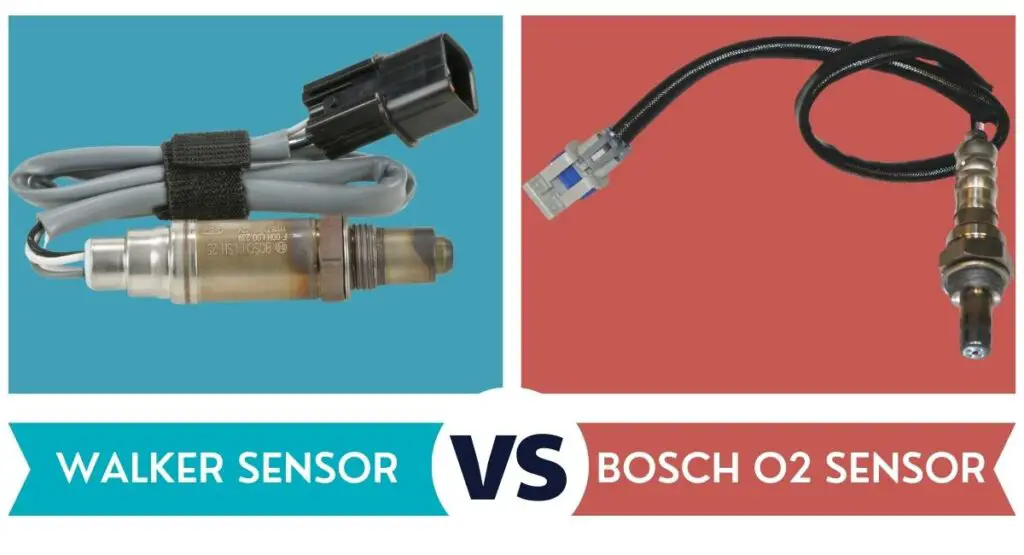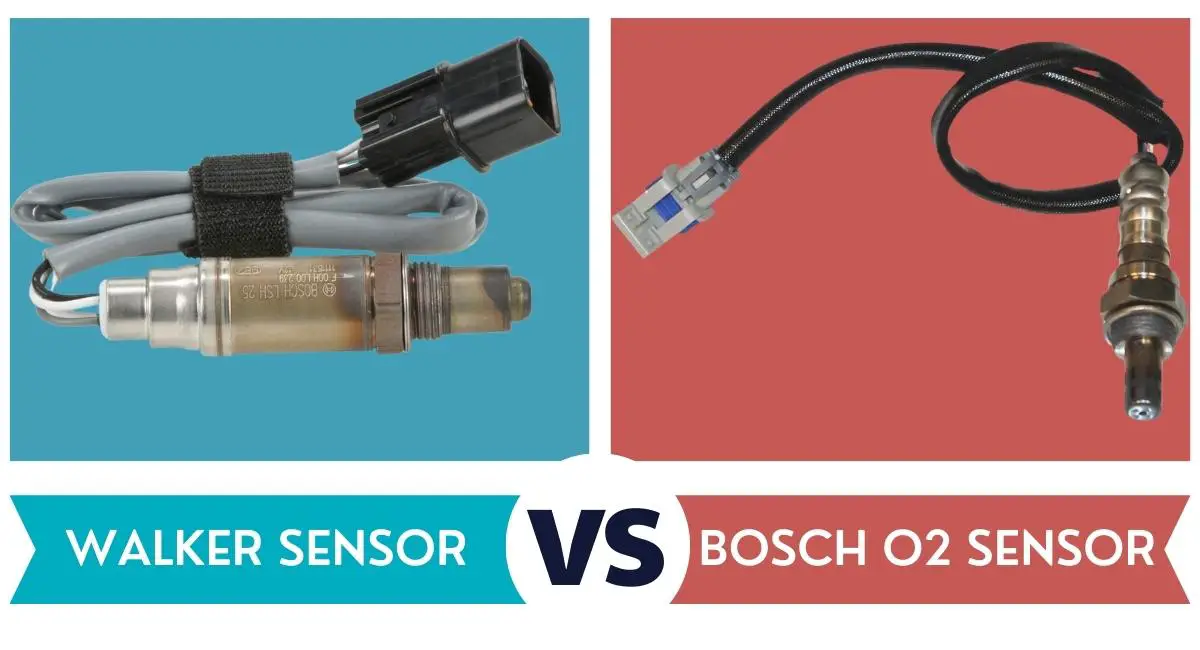In the intricate realm of automotive engineering, where every component plays a vital role, oxygen sensors stand tall as unsung heroes, quietly optimizing engine performance and fuel efficiency.
These small yet mighty devices are responsible for monitoring the oxygen content in exhaust gases, allowing the engine control unit (ECU) to fine-tune the air-fuel mixture and unleash the full potential of your vehicle.
Two popular brands stand out when choosing the right oxygen sensor: Walker and Bosch. This article will comprehensively compare the Walker vs. Bosch O2 sensor, assessing whether Walker O2 sensors are good. But first
What is an O2 Sensor
An O2 sensor is a device that continuously assesses the oxygen content in the exhaust gases of an internal combustion engine. It is an essential component for maintaining fuel efficiency and reducing vehicle emissions.
The oxygen sensor Situated within the exhaust system generates a voltage proportional to the oxygen concentration in the exhaust compared to that in the air (below 150 mV when lean and above 750 mV when rich). This information is essential when regulating the air-fuel blend via PORT or TFI injectors and carburetors.
There are two main types of O2 sensors: narrow-band and wide-band. Narrow-band sensors are more common and are typically used to monitor the air-fuel ratio, while wide-band sensors are more advanced and can provide more precise readings.
Besides, among the prominent players, Walker and Bosch have solidified their positions as trusted brands renowned for their quality and performance. Below we explore the realm of the Bosch vs. Walker oxygen sensors, unveiling the key features, performance benchmarks, and user insights that will empower you to make an informed choice.
Walker O2 Sensors
Walker Products is a renowned name in the automotive industry. They have been producing various automotive parts including O2 sensors, known for quality and performance.
Walker O2 sensors come in various types tailored for different applications. The company emphasizes the production of durable sensors that provide precise readings.
Furthermore, Walker Oxygen Sensors contribute to lower emissions, ensuring a greener and cleaner environment. With their advanced technology, they optimize fuel economy, allowing you to go further with each gallon of fuel.
Plus, they boast an extended sensor life, offering durability and reliability for the long haul. Rest assured, these sensors meet and adhere to the strict OEM specifications, guaranteeing a seamless fit and integration with your vehicle’s systems.
Are Walker O2 Sensors good?
Walker has garnered a reputation for manufacturing high-quality O2 sensors. Experts and consumers often praise their sensors for their durability and precision. Some users have raised concerns about compatibility with certain car models.
Walker O2 sensors offer compatibility with a wide range of vehicles, encompassing domestic, European, and Japanese models. These sensors have a built-in heater that effectively reduces the warm-up time during cold starts, ensuring optimal performance.
With their sturdy stainless steel construction, Walker O2 sensors exhibit exceptional resistance to damage, guaranteeing long-lasting durability. Additionally, these sensors boast a pre-programmed voltage range, enabling seamless calibration to meet the unique requirements of each vehicle, simplifying the installation process and ensuring efficient operation.
Introduction to Bosch O2 Sensors
Bosch is another heavyweight in the automotive industry. With a storied history, it has made significant contributions to automotive technology.
Bosch offers a diverse range of O2 sensors. They were the first to introduce the O2 sensor to the automotive market, and their sensors are of high quality.
These sensors generally boast robust construction and reliable performance. However, just like Walker sensors, some consumers have reported issues concerning compatibility and the installation process.
Plus, Bosch O2 sensors incorporate a distinctive design that integrates a ceramic element, effectively minimizing heat generation during sensor operation. This innovative design not only enhances accuracy but also promotes reliable readings.
Moreover, Bosch O2 sensors are meticulously crafted with a ceramic coating, providing additional protection to safeguard the sensing element against potential damage or corrosion. The advanced internal construction of these sensors further contributes to their superior performance by minimizing interference from other vehicle components, ensuring precise and uninterrupted operation.

Comparing Walker vs Bosch O2 Sensors
When comparing Walker and Bosch O2 sensors, several key features come into play:
Durability
In terms of durability, Bosch oxygen sensors outperform Walker sensors by a significant margin. Bosch sensors boast an impressive lifespan of up to 90,000 miles, ensuring long-lasting and dependable readings.
In contrast, Walker sensors offer a considerably shorter lifespan of only 30,000 to 50,000 miles. This substantial disparity in longevity highlights the superiority of Bosch sensors for those seeking consistent and precise data over extended periods.
Both companies produce durable O2 sensors. However, according to some user feedback, Bosch sensors tend to have a slightly longer lifespan compared to Walker sensors.
Performance
In terms of performance, both brands are almost neck and neck. Walker sensors are praised for their accurate readings, whereas Bosch is known for reliable and consistent performance.
Walker Oxygen Sensors are expertly crafted with precision to deliver exceptional performance. These sensors are designed to enhance engine response and overall performance, significantly boosting your vehicle’s power.
Bosch oxygen sensors leverage cutting-edge technology to achieve the ideal balance of the fuel-air mixture, resulting in unparalleled engine performance and maximized fuel efficiency.
Compatibility
According to Walker 02 sensor reviews, these sensors can provide a versatile fit across a wide range of vehicles. In contrast, Bosch sensors offer a more precise fit for specific models.
Installation
Installation is a breeze with the Bosch oxygen sensor, as it has a user-friendly design and is compatible with a diverse range of vehicles. Its hassle-free installation ensures convenience and simplifies the maintenance and servicing process, making it effortless to diagnose any potential issues. However, Walker has been trying to simplify its sensors’ installation process.
Price
While there is a noticeable contrast in durability between these two brands, they share an equal footing when it comes to price. Both Bosch and Walker offer oxygen sensors at a similar price generally, ensuring that you can acquire a high-quality sensor without straining your budget. Rest assured; you won’t have to break the bank to obtain a reliable and efficient oxygen sensor from either of these reputable brands.
Additional Considerations
When choosing an O2 sensor, ensure it’s compatible with your vehicle. Proper installation is crucial, as an improperly installed O2 sensor can adversely affect performance. Be aware of signs that indicate a faulty O2 sensor, such as poor fuel economy and increased emissions, and adhere to maintenance best practices.
Important Read: Aluminum vs Copper Crush Washer: Choosing the Perfect Seal
In the Bosch vs. Walker oxygen sensor battle, it’s essential to consider expert opinions and case studies. Many experts hold both brands highly, though preference might lean towards one depending on specific requirements.
Conclusion
In summarizing the bosch vs. Walker oxygen sensor debate, both brands manufacture high-quality sensors that are durable and perform efficiently. Ultimately, the choice between Walker and Bosch should result from your personal needs, vehicle type, and budget. Both brands are reputable and produce reliable O2 sensors.

